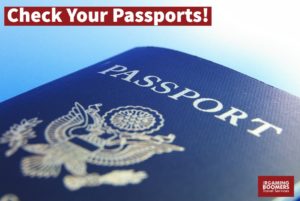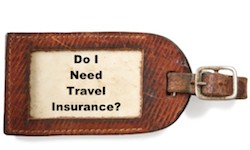U.S. Passports: Applications and Renewals
 U.S. Passports: Applications and Renewals
U.S. Passports: Applications and Renewals
U.S. Passport Applications and Renewals are taking longer than normal.
In fact, according to the U.S. Department of State, normal processing times have crept up to 10-12 weeks. And even expedited processing times have grown to 4-6 weeks.
Please, if you have an upcoming international trip, pull out your passport and check:
- The expiration date on your passport
- The number of blank pages you have in your passport.
We have received several panicked phone calls from clients who realized that their passports were expiring. Please don’t let this be you!
Passports
Here’s this from the U.S. State Department: a passport is a U.S. citizen’s key to international travel. Due to a surge in passport applications, travelers should apply several months in advance, especially if they need visas for their foreign destinations. Travelers should make sure their passport is valid at least six months after returning home and has two or more blank pages, or some countries may not let them enter. Note that passports for children under 16 are valid for five years and adult passports for 10 years, so check expiration dates carefully. We recommend all cruise ship passengers have their passports with them in case of emergency, even if not required.
International Traveler’s Checklist
Here are informative links that we highly recommend you familiarize yourselves with as you plan for international travel:
Get Informed
- Safety and Security Information: Read the Travel Advisory and Alerts for the countries you will be visiting at travel.state.gov/destination. Review entry/exit requirements, visas, local laws, customs, medical care, road safety, etc. Write down contact details for the nearest U.S. embassy or consulate to carry with you in case of emergency while traveling.
- Crisis Planning: Read Crisis Abroad: Be Ready and make an evacuation plan that does not rely on the U.S. government. Consider buying emergency evacuation insurance. If a crisis occurs while you are abroad, check in with loved ones and update your social media status, so family and friends know you are okay.
- Health Precautions: Read Your Health Abroad and check out recommendations for vaccinations and other health considerations from the U.S. Centers for Disease Control (CDC) and World Health Organization (WHO).
- Money Matters: Before going abroad, notify your bank and credit card companies of your travel, and check exchange rates. For information about using cash, debit/credit cards, and ATMs overseas, read information about your destination.
Get Required Documents
Safeguard Your Documents! Make two copies of all your travel documents in case of emergency. Leave one copy with a trusted friend or relative at home and carry the other separately from your original documents. To help prevent theft, do not carry your passport in your back pocket and keep it separate from your money.
- Passport: Apply several months in advance for a new passport. If you already have one, it should be valid for at least six months after you return home and have two or more blank pages, depending on your destination. Otherwise, some countries may not let you enter.
- Children’s passports: Passports issued for children under age 16 are valid for only five years, not 10 years like adult passports. Check passport expiration dates carefully and renew early.
- Europe Travel via Canada and UK: Europe’s 26 Schengen countries strictly enforce the six-month validity rule. If you are transiting through Canada or the UK: which do not have that requirement: your passport must be valid for at least six months, or airlines may not let you board your onward flight to Europe.
- Visas: You may need to get a visa before you travel to a foreign destination. Contact the embassy of the countries you will be visiting for more information.
- Medications: Some prescription drugs, including narcotics and some U.S. over-the-counter medications, are illegal in other countries. Check with the embassy of your destination(s) about regulations and documentation before you travel.
- Consent for Travel with Minors: If you are traveling alone with children, foreign border officials may require custody documents or notarized written consent from the other parent. Check with the embassy of your foreign destination before traveling to see what you may need.
- International Driving Permit: Many countries do not recognize a U.S. driver’s license, but most accept an International Driving Permit (IDP). You may also need supplemental auto insurance. Read more about driving and road safety abroad before you go.
Get Enrolled
- Smart Traveler Enrollment Program (STEP): Enroll for free at STEP.state.gov to receive travel and security updates about your destination and to help us reach you in an emergency. Groups or organizations can create an account and upload a spreadsheet with contact details for multiple travelers.
- Twitter and Facebook: Follow TravelGov on Twitter and Facebook https://travel.state.gov/content/travel/en/international-travel/International-Travel-Country-Information-Pages.html
Get Insured
- Health Insurance: Many foreign medical facilities and providers require cash payment upfront and do not accept U.S. insurance plans. Medicare does not provide coverage outside of the United States. Check your U.S. health care policy to see if it will cover you overseas. If not, consider buying supplemental insurance. Make sure the insurance you purchase covers any special medical needs or risks you anticipate on your trip.
- Emergency Evacuation: Evacuation for medical treatment or to leave a crisis area in another country can cost more than $100,000. You should strongly consider purchasing evacuation insurance in case of an emergency overseas.
- Unexpected Expenses: Trip interruption or cancellation, flight delays, lost or stolen luggage, and other unexpected travel costs can add up. Check with your credit card and homeowners insurance companies to see if they provide coverage. If not, consider additional insurance.
I know that this is all a lot to consider. However, it is very important that you spend some time poking around all of the above links. What could be worse than traveling all the way to your international destination and being turned away because you do not have the required number of blank pages in your passport, a required travel insurance policy, or worst of all, an expiring passport.
PLEASE CHECK YOUR PASSPORTS!
If you enjoyed this article, sign up for our travel newsletter to keep abreast of our best travel tips, on-location reviews, exclusive travel offers, group travel events, and much more.

Roaming Boomers Travel Services is an Independent Affiliate of Cadence, a Virtuoso® member. CST#201120-40
 The Roaming Boomers
The Roaming Boomers



